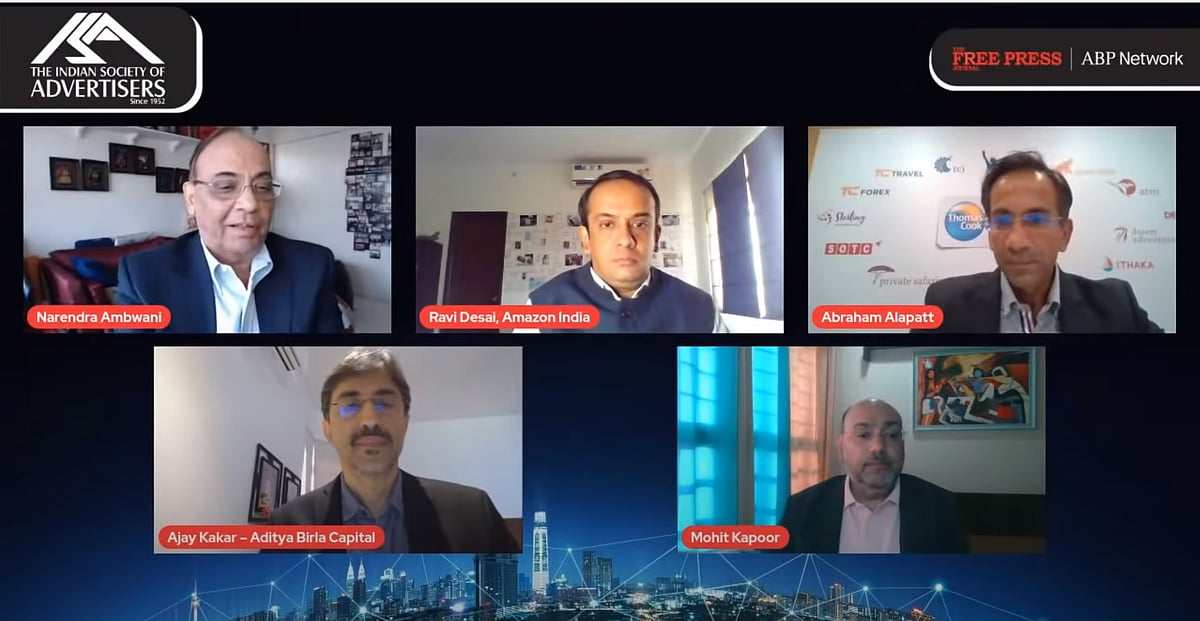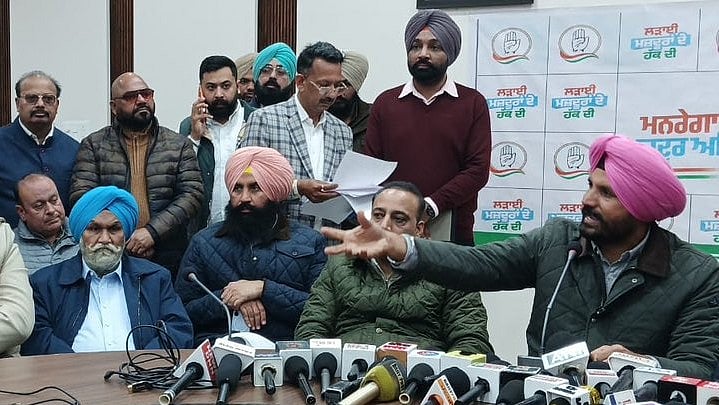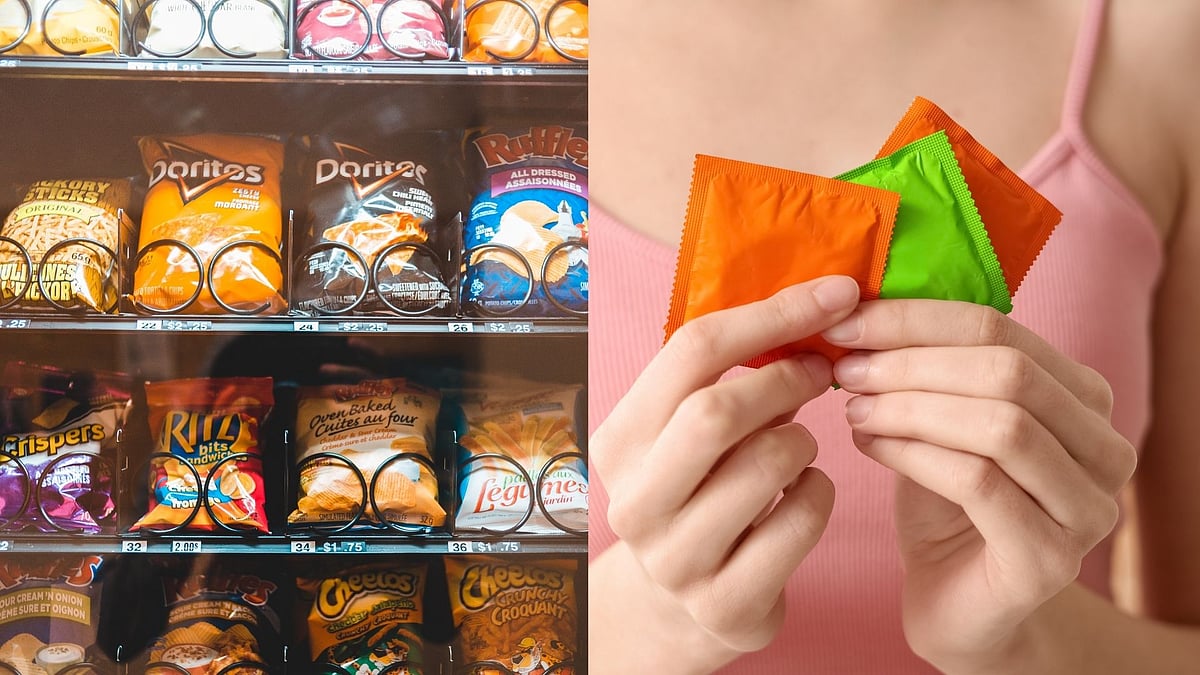In the second of a two-part webinar series titled Brands and Consumers: 2021 and Beyond, leading marketers from the services sector share their thoughts on the challenges that they have faced, and how they perceive the future in terms of emerging opportunities - new demands, new service expectations from consumers, and more
The COVID-19 pandemic has significantly impacted brands, and consumer behaviour has gone through a paradigm shift. Therefore, this is the time to devise strategies for the way forward, both in the short term as well as the long term. In this context, the Indian Society of Advertisers (ISA) recently organised the second of a two-part webinar series titled Brands and Consumers: 2021 and Beyond, in association with the Free Press Journal and ABP Network. On March 3, prominent marketers from the services sector – all ISA members - took part in a webinar moderated by Narendra Ambwani, ISA Executive Council and former MD, Johnson & Johnson. The participants were (in alphabetical order) Abraham Alapatt, President and Group Head-Marketing, Service Quality, Financial Services & Innovation, Thomas Cook (India) Limited; Ajay Kakar, Chief Marketing Officer, Aditya Birla Capital; Mohit Kapoor, Group Vice President -Advertising & Innovations, Jio Platforms Limited; and Ravi Desai, Director, Mass & Brand Marketing International, Amazon India.
The knowledge partner for the webinar is Mogae Media and Laqshya is the outdoor partner.
Narendra Ambwani: Will the definition of BC in the calendar change to ‘Before COVID?’ It just might, as we have come through a historic crisis, recognized as the mother of all Black Swan events. Today, we have invited four leading marketers to share their thoughts on the challenges that they have faced, and how they perceive the future in terms of emerging opportunities - new service requirements, new service expectations from consumers, and so on. So what have you and your industry gone through? What is coming back, and what will never come back? Also, how are you adapting and what are the new opportunities?
Abraham Alapatt: The last 12 months have probably compressed our learning as marketers, and the industry as a whole too, packing in a 12-year experience in 12 months. Earlier, the challenge for a brand was service differentiation and trying to get market-share. Post-pandemic, forget brand and service preference or market-share, we were actually talking of the entire travel category demand sinking to zero almost overnight. Obviously, this was due to physical restrictions because of Government regulations. We had to take some fundamental steps.
The first thing we did as we went into lockdown was to stay connected to the customer, because most of the competition went into hibernation and hiding. It was important for us to stay out there and inspire confidence. So we kept in touch with newsletters, updates, our business teams were in touch personally, etc. We did two surveys, to get a pulse of things – one in May and another in November. They gave us a real sense of what customers are talking about. The first thing was safety. It was very important physically to have/give the reassurance of safety. The second was financial security. And the third was the continued promise of safety and hygiene. So, we launched something called Assured Insured Secured. Assured, we built the most comprehensive travel safety protocols in partnership with Apollo. The second was work with our insurance partners to ensure comprehensive insurance for COVID. Third, the financial security part - we ensured customers had the freedom of flexibility, rescheduling cancellation, and of course refunds. This was very important and contextual, given what is happening in the market. Talking about new business opportunities, one mid-term opportunity is COVID-19 certification for travel. It's a business that we are in and actually have tied up with ICMR labs across the country to provide these services. Our corporate travel teams have been engaged in repatriating citizens to various countries, and now they are engaged with moving workforces back into organizations as lockdowns ease. Our MICE teams have been engaged with virtual events, and not just for India. We've actually done events for companies in Myanmar, Vietnam, etc. The travel ecosystem is going to be actually about four Ds. The customer is going to deliberate decisions more, be more discerning in terms of choice, more demanding in expectations. Finally, they're going to be more discovery-oriented. They're going to be looking more at experiences rather than places. Domestic tourism has already got a tremendous boost. The pandemic is also going to ensure that only strong players survive.
Ajay Kakar: The Indian financial services industry is so heavily under-penetrated that we are called a 5% industry. But the pandemic made us witness the true power of marketing. For example, no one buys a financial services product - you have to sell it. The pandemic proved that if the marketer identifies the right key to the right lock, which is a customer's heart and wallet, he can actually transform customer behaviour. He can actually convert a push category to a pull category overnight. So we saw health and wealth becoming a primary customer need of mass India in a matter of days – something that hadn't happened in decades. It gave an impetus to health insurance, life insurance and mutual fund industries.
During this period, I also learnt that brand visibility is important in bad times. When you represent the category of money or promise, if you do not stay connected with your customers in bad times, it is going to harm your relationship, your brand and your future. Also, it's not about brand awareness or advertising, giving your name and logo. It's about brand relevance. There is this YouTube film where they have taken the leading brands from around the world, and made one mashup film out of all of them, because all were saying the same thing - we are with you, we care for you, we love you; reach out to us at any time. So how you are creating relevance for your brand becomes important. Then, it is not important to look at new prospects all the time. You have to be there first for your existing customers. Another learning as a category or brand is that you cannot touch or experience our brand, therefore you touch and experience the brand persona, the people. Suddenly we realized how important hi tech is, but it will never come at the cost of high touch. The last learning for me was - it's not about marketing, it's not about being a CMO. You have to be a CMO, who is as savvy as a CTO, and has an eye out as a CFO. Every rupee spent by you has to matter.
What's the post COVID world going to look like? The jury's still out on that. Don't take customer elasticity for granted. Keep your options open. Don't jump ship and go in the other direction. Wait for the customer. Listen to what the customer says, or what is left unsaid. Be flexible and nimble, to change as soon as the customer changes.
Mohit Kapoor: Last year, we had a 24% contraction in the April quarter, and that was the worst we saw since 1997-98, but some industries did well, like fertilizer industries, the agri-chemical industries, the essentials, and the pharma industry actually grew during this period. So, some good stuff has been happening. Let me talk about 2021 and beyond, about the ‘S’s, starting with Smartphones and Social, and within social, social gaming and social commerce, and also about Silence.
One clear trend is action in smartphones - we already sold 500 million smartphones, and it will be about 830 odd million smartphones by 2022. Now, India is really moving towards a ‘2G-mukt Bharat’ as we call it. That's a trend to watch out for, and then once you have that kind of smartphone penetration, Social takes over. Interestingly, Facebook has 340 million plus users, Insta has 120+ million users in India, so there's been a lot of growth across all social networks. In a live streaming sales event of Tommy Hilfiger in China, 14 million people joined, and they sold about 1,300 hoodies in just two minutes. Social commerce or live streaming sales are predicted to generate close to $ 25 billion by 2023. When a beauty company called Clarins shut down, one of their beauty consultants started doing Instagram stories from home and sale completion rates increased from 20% to 75% in no time. Social commerce is definitely a thing for brands to piggy-back on. The other trend is social gaming. In the last one year, India actually rose to No. 1 spot. We downloaded more than 7 billion games, and the total number of gamers in the country rose to 365 million. Half of our population is under 25 years of age, and 60% of the gamers are also under 25 years. Then there's e-sports - about 4% odd of the entire gaming pie. People will be watching the gamers, the way they watch cricket.
An important S is silence. We do campaigns for a lot of FMCG brands, and I noticed that Coke was not advertising a lot during the lockdown period. I asked and they told me that they were listening! I found it very intriguing. There's going to be a great divide between some companies that will completely reinvent themselves and companies that will wait for normalcy to come back. And that's probably not coming. Companies will be figuring out what a physical environment offers, and how that experience can be delivered online.
Ravi Desai: Let me start by focusing on what is not going to change and how important it is for a brand or a business to anchor to what you understand deeply within your customers’ lives around needs that are not going to change. From Amazon's perspective, we anchored very early to this whole fundamental around our business - a customer's need for a wide selection of products at everyday low prices and delivered home as quickly and conveniently and as safely as possible.
These three fundamentals have not changed. If anything, I dare say they will probably not change in the foreseeable future as well. These have actually become even more relevant for customers at scale - ‘Do I need an even wider selection from somebody like Amazon?’, ‘Would I want to get it at even lower prices?’, ‘Would I want it delivered quickly?’. People are far more confident today, to step out and buy stuff. But they still want deliveries to happen as quickly and safely as possible.
The second facet is more along the lines of the first one - as long as trust and attention continue to be scarce, brands will continue to matter. The last few months have taught us that there is a need for brands to demonstrate responsibility towards the country, economy, and customers at large. In a sense, customers are curious and in fact now prefer brands that go beyond the transaction. So brands that are built for permanence and not just today's performance are probably the set of brands that might come out as most trust-worthy for customers. As a marketer, you want to think about not just the key value proposition, but also the key responsibility proposition. In that sense, there are some of our pledges where we said we will digitize, say, 10 million MSMEs, enable about $10 billion of exports from the country and in the process create a million incremental jobs in the country. What has changed is, consumption is happening not just at home, but also for the home. So the customer is inspecting the price value equation very differently today than she used to in the past. For example, we have seen strong adoption for a programme like Prime, that offers entertainment, both streaming videos as well as music, and great shipping benefits. So think deeply about which parts of your business or your brand are likely to remain permanent and relevant to the customer and see if you can make that even more core for your business offering and to your brand proposition.
Narendra Ambwani: I will now take some questions that have come through Twitter. First question, what are the most critical considerations for the brand as we go into the next phase of opening up of the economy? Any of you can take this.
Ravi Desai: The pace of change has to be accelerated. The ‘new normal’ will probably take more time in evolving, and you want to stay connected with your customer as much as you can so that you can stay with her as she evolves and your brand can evolve with her.
Narendra Ambwani: Have consumers’ expectations from brands changed during this period?
Mohit Kapoor: Consumers probably don't know exactly what to expect from brands, but it's the brand's responsibility to communicate with the customer. Brands which stepped up and genuinely got involved with their users with a purpose, are the kind of brands which consumers are appreciating, and in future it's going to be extremely rewarding.
Ajay Kakar: The days of mass media are dead. When you have one message going out to a million people, that is no message at all. Today, you have to tell me why is that message relevant for me. Why me, why today and why you - all three together make a brand more relevant than just any one of those messages.
Narendra Ambwani: Abraham, particularly for the travel industry, the expectations must have undergone a sea change in terms of what consumers expect from travel providers such as you.
Abraham Alapatt: Absolutely. Besides staying connected, we actually reached out pro-actively to customers who had booked holidays with us, when we went into lockdown and reassured them about refunds. About 80% of those customers were happy that we did, and left their money with us with a credit note. Going into hiding would not have served our purpose. In a sense, customers are saying, I am willing to recognize the value you bring, added safety and hygiene, and I'm willing to pay you more. I also trust you more, but don't misplace that trust.
Narendra Ambwani: Talking to all of you, what I can conclude is, trust becomes even more important, going forward. Brands have to address the fears of consumers with regard to services. Another question, specifically for travel and Abraham - when will the fear of travel get over?
Abraham Alapatt: In November and December, 2020, we saw a huge burst of bookings, not just domestically, but for destinations like Maldives and Dubai. Maldives was one of the least preferred destinations for Indians but thanks to the pandemic and other destinations being closed, 10% of all visitors to Maldives during this period were Indians. With destinations opening up, we are seeing bookings for Russia, Egypt, Europe and the like. Finding great deals - prices are at half of normal or even lower sometimes - people are travelling.
Narendra Ambwani: Business travel, a significantly more profitable part of travel, has been impacted. In fact, people have learnt to use Zoom for even Board meetings. So how do you see that scenario?
Abraham Alapatt: It is coming back in some form already, as businesses are re-opening. We see a fair amount of travel to crank up businesses that have been shut for almost a year. Workforces that had moved home to native places are now coming back to work. Will travel come back to the old numbers in a hurry? Probably not, but those of us who have gone back to work have realized how much more efficient some physical meetings are, not to discount the value of technology platforms like Zoom and Microsoft Teams. The meetings, incentives conferences and exhibitions space is coming back in a big way.
Narendra Ambwani: I have a question for Ajay. During this period, a lot of new customers came into the capital market and started investing, as they had money to spare. Do you think this inflow of people will continue now that things are going back to normal?
Ajay Kakar: COVID times have done a lot to get customers out of their pre-conceived notions. But COVID or no COVID, people realise there is more to life than work. And when there is work, but no money, what do you do? The importance of money has come to center-stage, and people are engaging with this industry far more pro-actively than ever before.
Narendra Ambwani: Well, it’s good for both investors as well as the market. Let me keep the forum open and any of you can add value by asking questions to one another or express any additional thoughts.
Mohit Kapoor: Abraham, is Thomas Cook planning to do virtual travel and is that also on the cards?
Abraham Alapatt: Actually, it already is, because, even today, we offer customers a sort of micro-virtual tour and video perspective of where they're going; that's becoming increasingly the new way of selling as well. Customers are actually beginning to have a heightened awareness of the importance of meeting friends and family. That's a very powerful opportunity not just from a travel point of view, but anybody who's in the business of hospitality, restaurants, social engagement, etc.
Ajay Kakar: What happens post this crisis, no one can predict. What will be the new ideas, new categories, new needs, new demands - none of us know and that's why I would say, keep your ear to the ground and pick up the signals.
Ravi Desai: I would want to sign off on an optimistic note that as far as India is concerned, we are still at the beginning of Day 1, from a glorious future standpoint.
Mohit Kapoor: We have to think ahead. It's a great situation that we're back to zero, and things can only grow from here. So great times ahead, actually, for everyone.
Narendra Ambwani: Thank you very much, Abraham, Ravi, Ajay and Mohit, for sharing your thoughts, revealing a clear picture of what we've all gone through, and how it is ending on a positive note and that we are coming back. The future is definitely looking brighter.










